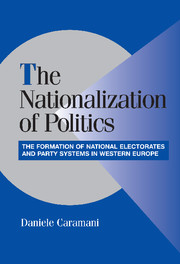 The Nationalization of Politics
The Nationalization of Politics Book contents
- Frontmatter
- Contents
- List of Tables
- List of Figures
- Abbreviations and Symbols
- Preface and Acknowledgments
- INTRODUCTION: HOMOGENEITY AND DIVERSITY IN EUROPE
- Part I Framework
- Part II Evidence
- Part III Toward an Explanation
- CONCLUSION: FROM TERRITORIAL TO FUNCTIONAL POLITICS
- Appendix 1 Party Codes
- Appendix 2 Territorial Units
- Appendix 3 Computations
- Appendix 4 Country Specificities
- Appendix 5 Sources
- References
- Index
- Cambridge Studies in Comparative Politics
INTRODUCTION: HOMOGENEITY AND DIVERSITY IN EUROPE
Published online by Cambridge University Press: 02 December 2009
- Frontmatter
- Contents
- List of Tables
- List of Figures
- Abbreviations and Symbols
- Preface and Acknowledgments
- INTRODUCTION: HOMOGENEITY AND DIVERSITY IN EUROPE
- Part I Framework
- Part II Evidence
- Part III Toward an Explanation
- CONCLUSION: FROM TERRITORIAL TO FUNCTIONAL POLITICS
- Appendix 1 Party Codes
- Appendix 2 Territorial Units
- Appendix 3 Computations
- Appendix 4 Country Specificities
- Appendix 5 Sources
- References
- Index
- Cambridge Studies in Comparative Politics
Summary
The nationalization of politics is a major long-term political phenomenon over almost two centuries. Nationalization processes represent a broad historical evolution toward the formation of national electorates and party systems, party organizations and campaigns, as well as issues and party programs. Through nationalization processes, the highly localized and territorialized politics that characterized the early phases of electoral competition in the nineteenth century is replaced by national electoral alignments and oppositions. Peripheral and regional specificities disappear, and sectional cleavages progressively transform into nationwide functional alignments. Through the development of central party organizations, local candidates are absorbed into nationwide structures and ideologies. Programs and policies become national in scope and cancel out – or at least reduce – the scope of local problems, with the most relevant issues being transferred from the local to the national level. These processes of political integration translate in the territorial homogenization of electoral behavior, both electoral participation and the support for the main party families.
Nationalization processes therefore represent a crucial step in the structuring of party politics. The nineteenth century witnessed the most striking changes in political life with the transition from absolutist to parliamentary regimes and with the progressive entry of the masses on the political stage through the extension of voting rights. Parliaments, that in many cases had not been convened since the end of the Middle Ages, were reintroduced (Bendix 1961; Hintze 1970).
- Type
- Chapter
- Information
- The Nationalization of PoliticsThe Formation of National Electorates and Party Systems in Western Europe, pp. 1 - 12Publisher: Cambridge University PressPrint publication year: 2004


